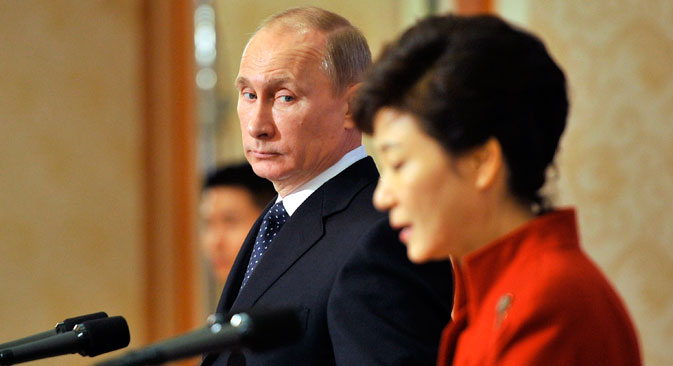
South Korean President Park Geun-hye (R) and Russian President Vladimir Putin delivering taking part at a joint news conference.
ReutersEven as Russia has embraced Western-style capitalism after the collapse of the Soviet Union nearly 25 years ago, many in Europe and North America still view Russian business culture as very difficult to understand.
In the interview below, researcher and social scientist Tatyana Indina, a fellow at Harvard’s Berkman Center in 2014-2015, explains the differences between Russian and Western business culture and gives valuable tips on how to deal with your Russian business partners.
 Tatiana Indina during the interview with Russia Direct in Moscow, Russia. Photo: Ruslan Faizulin
Tatiana Indina during the interview with Russia Direct in Moscow, Russia. Photo: Ruslan Faizulin
Russia Direct: What is the most difficult lesson for an American or Westerner when doing business with Russians?
Tatyana Indina: Today, Russian businesses have to deal with a lot of stereotypes about Russia, and the “information wars” contribute to that negative image in the international arena.
Undoubtedly, to be successful in negotiating and establishing relations with Russian business partners, one needs to know their core values and to understand the unique Russian psychology.
Russia Direct: Like the fact that Russians don’t smile?
T.I.: Yes, but not just that. For example, it’s also the low predictability of actions, reactions and behavior in general. Sometimes it is hard to understand Russians because of their high emotionality. In many cases, business and its outcome depends on personal relationships or some external circumstances that are hard to predict.
There is one very important metaphor – and a major one in Russian fairy tales – the metaphor of a miracle. In all Russian fairy tales, a miracle always saves the main heroes. In other words, there is no connection between one’s efforts and the final results.
Russia Direct: What are the other major specifics of the Russian mentality that affect business culture and make Russia different from other countries?
T.I.: Value number one for Russians would be collectivism. Russian culture is very collective and there is no concept of privacy. This is why business relations are always built on personal relationships.
Another important trait is that Russians are quite emotional. Business partners in Russia can be more critical and honest, not playing mind games. They will say straight to your face everything they think. If they don’t like you, you will immediately know it.
Russia Direct: In the West this is considered quite rude. What’s behind that?
T.I.: Russians value everything real, true, honest. They can fight and argue with you at the beginning just to understand who you really are and what you stand for. You need to demonstrate your real personality, what you really mean and want.
When dealing with Russia, one should also remember that Russians have an imperial identity. They are very patriotic and proud of their historic and cultural heritage, e.g. the victory over Nazi Germany in World War II and their heroic ancestors, as well as Russian arts and science. A piece of good advice would be to know those things and demonstrate your appreciation and awareness of Russia’s great history and culture.
Russia Direct: Does Russia’s geographical location affect Russia’s business culture?
T.I.: Of course. Being located in Eurasia, Russia has borrowed a lot from the Asian mentality. For example, polarized gender roles, hierarchy in management, strong respect for authority and family values and the important role of traditions.
One of the dimensions of the highly patriarchal Russian culture is their respect for strong leadership. Another peculiarity of the Russian mentality is a primary emphasis on the present rather than the future. Russian managers often do not set long-term goals.
This makes Russian business people mostly oriented to getting profits as soon as possible. When negotiating with Russians, one should demonstrate the real value of the present moment.
Russia Direct: What would be your key tips for successful business negotiations with Russian partners?
T.I.: Tip number one: demonstrate strong leadership, be real, be honest, and be cool. Demonstrate that you are ready to stand up for your values and that you are ready to fight if needed.
Another piece of advice is to be friendly and try to invest a lot of time and efforts in building a good personal relationship with your Russian business partner. Meet personally often, party together, let your partners know what kind of person you are. Go with them to a dacha (summer house), banya (steam sauna), or eat shashlyki (grilled meats similar to shish kebabs) with them.The next important thing to remember is to focus on the present. Whenever you make an offer or deal, demonstrate the benefits of it in the present. Do not speak about the distant future.
Also, be generous. You could invite your Russian business partners to a fancy restaurant and pay for everything. Russians love big gestures. Keep in mind that they are a very gift-giving culture.
And if something goes wrong or not the way that you expect, just relax and take it easy. Remember: If it’s not OK, it’s not the end.
What are other major differences between Russian and Western business etiquette?
What are the specifics of the Russian style of business management? Are Russian managers and employees different from the West?
Read the full version of the interview at the Russia Direct website
All rights reserved by Rossiyskaya Gazeta.
Subscribe
to our newsletter!
Get the week's best stories straight to your inbox